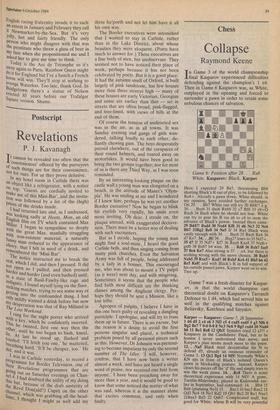Postscript
Revelations
P. J. Kavanagh
It cannot be revealed too often that the 'conveniences offered by the purveyors of such things are for their convenience, not for ours. For us they prove delusive. In my hotel room in Carlisle there was an object like a refrigerator, with a notice on top: 'Guests are cordially invited to Make use of this Mini-Bar', and the invita- tion was followed by a list of the (high) Prices of the drinks inside. I had returned late and, as I undressed, Was looking sadly at Hoots, Mon, an old English film on TV which contained Max Miller. I began to sympathise so deeply With the great Max, manfully struggling With non-existent material, a naturally f;Ati,nhy man reduced to the appearance of "Gey, that I felt in need of a drink, and remembered the `Mini-Bar'. The notice instructed me to break the seal, which I did, and then I pressed. It did not open so I pulled, and then pressed harder and harder (and even bashed) until, in a state of Basil-Fawlty-like rage and indignity, I found myself lying on the floor, striking matches, trying to see some way of , getting into the confounded thing. I had °tilY mildly wanted a drink before but now hlY desperation was that of Ray Milland in The Lost Weekend. I rang for the night porter who arrived With a key, which he confidently inserted. This he twisted, first one way then the Other, until he too began to bash, kneel, r ie. At last he stood up, flushed and tousled: 'I'll fetch you one,' he muttered, breathing hard. 'It'll be cheaper, too.' He Id, and it was. I was in Carlisle yesterday, to record a Programme for Border Television, one of their Revelations programmes that are going out on Saturday evenings on Chan- nel 4. 1 had doubted the utility of my doing this but, because of the drab austerity of The Revd Don(ald?) Cupitt on the other channel, which was grabbing all the head- lines, I thought I might as well add my three ha'porth and not let him have it all his own way. The Border executives were astonished that I wanted to stay in Carlisle, rather than in the Lake District, about whose beauties they were eloquent. (Poets have much to answer for.) These executives are a fine body of men, but unobservant. They seemed not to have noticed their place of work, perhaps because it has not been celebrated by poets. But it is a good place. It had the autumn smell of Oxford, is built largely of pink sandstone, has few houses more than three storeys high — many of these houses are early Victorian, Georgian and some are earlier than that — set in streets that are often broad, pink-flagged, and tree-lined, with views of hills at the end of them. Of course the tension of undirected sex was in the air, as in all towns. It was Sunday evening and gangs of girls wan- dered, talking loudly to each other, de- fiantly chewing gum. The boys desperately peered elsewhere, out of the carapaces of their round helmets, and roared away on motorbikes. It would have been good to bring the two groups together; nor for most of us is there any Third Way, as I was soon reminded. By an interesting-looking plaque on the castle wall a young man was elongated on a bench, in the attitude of Manet's 'Olym- pia'. He was smiling at me and I wondered if I knew him; perhaps he was yet another Border executive? Now he began to blink his eyelids very rapidly, his smile even more inviting. Oh dear. I strode on, the plaque unread, with exaggerated decisive- ness. There must be a better way of dealing with such encounters. But as I strode, hoping the young man might find a soul-mate, I heard the good Carlisle bells, and then singing coming from many pink churches. Even the Salvation Army was full of people, being addressed by a lady in a bonnet. This encouraged me, who was about to mount a TV pulpit (as it were) next day, and with misgiving. Sometimes it seems that the people who find faith most difficult are the thinking classes among the Anglican clergy. Per- haps they should be sent a Mission, like a lost tribe. Apropos of pulpits, I believe I have in this one been guilty of revealing a dangling participle. I apologise, and will try to truss them up in future. There is no excuse, but the reason is a desire to avoid the first persons singular and plural, a technical problem posed by all personal pieces such as this. However, Dr Johnson was pretend- ing to become impatient by only the second number of The Idler. 'I will, however, confess, that I have now been a writer almost a week, and have not heard a single word of praise, nor received one hint from anyone.' I have been preaching away for more than a year, and it would be good to know that some noticed the matter of what was said, whereas it is the manner alone that excites comment, and only when faulty.














































 Previous page
Previous page